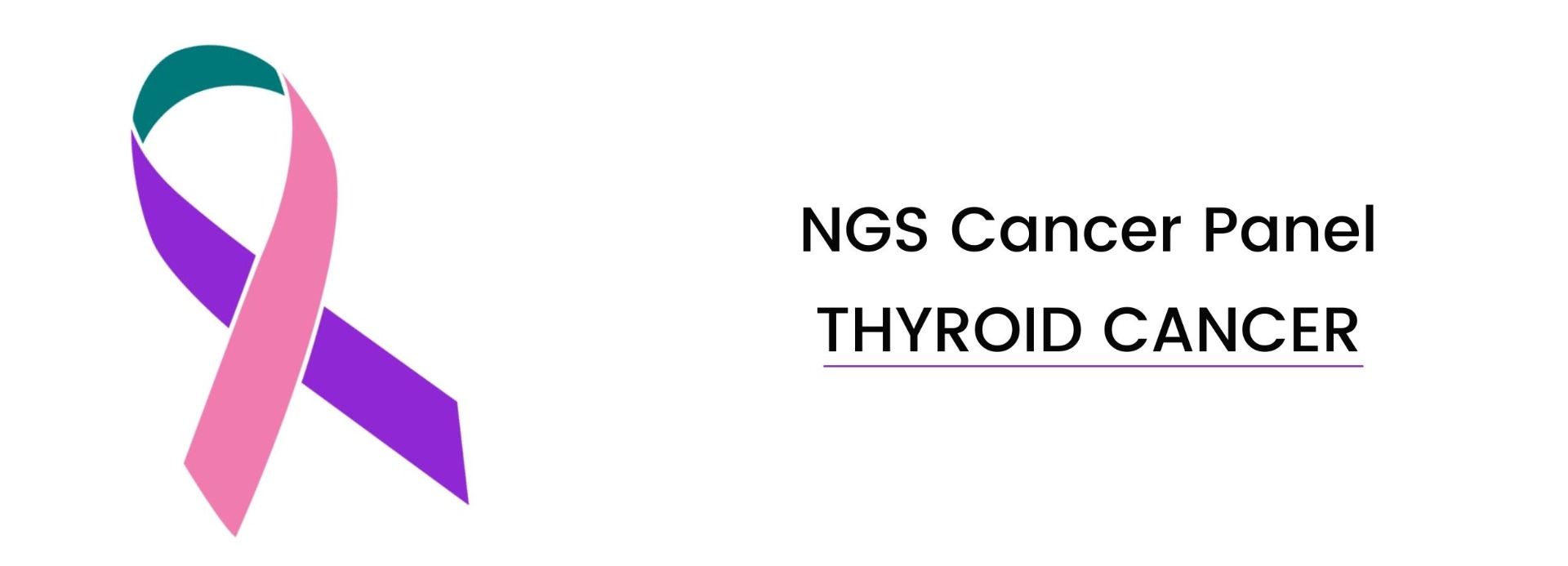
Thyroid Cancer
What is DNA OncoNex ?
Every year, about 12,000 men and 33,000 women get thyroid cancer, and about 950 men and 1,100 women die from the disease.1
DNAOncoNex is a comprehensive targeted Next Generation Sequencing (NGS) assay for 70 genes associated with Thyroid cancer. NGS assay offers identification of numerous novel genetic aberrations and associated potential therapeutic targets in many cancers.
- Offers insights into the molecular underpinnings of the associated tumour mutation genes.
- With targeted therapies becoming the new standard of care in oncology, this NGS-driven diagnostics approach provides the choice of therapy to optimize patient outcomes in the future.
Why NGS for Thyroid Cancer ?
According to Surveillance, Epidemiology, and End Results (SEER) data, 89.9% of patients diagnosed with thyroid cancers have papillary thyroid carcinoma (PTC), 4.5% follicular thyroid carcinoma (FTC), 1.5% Hurthle-cell carcinoma, and 0.8% anaplastic thyroid carcinoma (ATC).
- NGS offers diagnostic improvements for fine needle aspiration (FNA) cytology of thyroid with indeterminate features. It also contributes to patient management, providing risk stratification of patients based on the risk of malignancy.
- Mutations in Telomerase Reverse Transcriptase (TERT) are very common in thyroid cancers, from 22% to 23% in papillary thyroid carcinoma( PTC) to over 50% in poorly differentiated thyroid carcinomas (PDTC) and anaplastic thyroid carcinoma (ATCs).
- The BRAF V600E mutation is the most common genetic mutation detected in patients with PTC and occurs in approximately 45% of patient.
- NGS enables massively parallel sequencing for a large number of genes with accurate reads while being relatively inexpensive.
Clinical Utility
- Identify Driver Mutations - mutation in the DNA Sequence that cause cells to become cancers , grow & spread in body
- Drug profiling for Chemotherapy & Targeted Drugs
- Predictive genomic biomarker identification to guide the therapeutic process
- The targeted NGS panel offers wide coverage and in-depth analysis to detect the known and novel variants
- The multigene approach reduces the time for diagnosis providing a more economical solution.
Mapmygenome Offerings
- Major emphasis on ~70 cancer genes associated to Thyroid Cancer.
- Screening for clinically significant genes based on National Comprehensive Cancer Network (NCCN) guidelines.
- Genetic counselling to guide through the report and discuss the available management & treatment options in case of clinical findings.
- Reporting - Pathogenic and Likely Pathogenic Variants are reported following the ACMG recommended guidelines.
- Best in class Bioinformatics pipeline for the most accurate analysis by our experienced Bioinformatics team.
Test sample requirements
| Technique Platform | Coverage | Variant types | TAT |
|---|---|---|---|
| NGS Illumina iScan | 800 - 1000X | SNV | 3 - 4 weeks |
Test specifications
| Technique | Coverage | Variant types | TAT | Sample requirements |
|---|---|---|---|---|
| NGS | 800 - 1000X | SNV | 3 - 4 weeks | FFPE (Formalin-Fixed Paraffin-Embedded) Sample - Somatic cases, Blood Sample - Germline cases |
References:
Write Your Own Review
